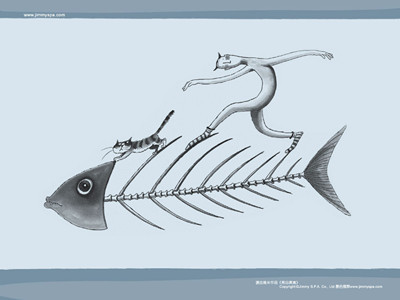
Luca is a tax accountant. An Italian tax accountant, which means that he is, in his own description, "an artist," because there are several hundred tax laws on the books in Italy and all of them contradict each other. So filing a tax return here requires jazzlike improvisation. I think it's funny that he's a tax accountant, because it seems like such stiff work for such a lighthearted guy. On the other hand, Luca thinks it's funny that there's another side of me—this Yoga side—that he's never seen. He can't imagine why I would want to go to India—and to an Ashram, of all places!—when I could just stay in Italy all year, which is obviously where I belong. Whenever he watches me sopping up the leftover gravy from my plate with a hunk of bread and then licking my fingers, he says, "What are you going to eat when you go to India?" Sometimes he calls me Gandhi, in a most ironic tone, generally when I'm opening the second bottle of wine.
卢卡是税务会计师。如他自己描述,一个意大利税务会计师意味着他是个“艺术家”,因为意大利有数百条税法,而且全部相互矛盾。因此在此地申报所得税需要爵士乐般的即兴创作。我认为他是个税务会计师真滑稽,因为这对一个无忧无虑的人来说似乎是件艰难的工作。另一方面,卢卡认为我那个他没见过的另一面——瑜伽那一面——也很滑稽。他想不通我为何想去印度——而且还挑了个道场——干嘛不整年待在显然令我如鱼得水的意大利。每逢他看着我拿面包沾取盘里剩下的肉汁,然后舔舔手指时,就说:“你去印度要吃什么?”有时他语气嘲弄地叫我甘地,通常在我开第二瓶酒的时候。
Luca has traveled a fair amount, though he claims he could never live anywhere but in Rome, near his mother, since he is an Italian man, after all—what can he say? But it's not just his mamma who keeps him around. He's in his early thirties, and has had the same girlfriend since he was a teenager (the lovely Giuliana, whom Luca describes fondly and aptly as acqua e sapone—"soap and water" in her sweet innocence). All his friends are the same friends he's had since childhood, and all from the same neighborhood. They watch the soccer matches together every Sunday—either at the stadium or in a bar (if the Roman teams are playing away)—and then they all return separately to the homes where they grew up, in order to eat the big Sunday afternoon meals cooked by their respective mothers and grandmothers.
卢卡经常旅行,尽管他宣称他只能住在罗马,离他母亲很近的地方,毕竟他是个意大利男人,能怎么样呢?然而让他留下的原因不仅是他的妈妈。他三十岁出头,从十几岁起就和同一个女朋友在一起(可爱的茱莉亚娜,卢卡亲热而恰当地形容她是“acqua e sapone”——“肥皂和水”,因为她既甜美又纯真)。他的朋友都是从小认识的,来自相同的邻里。他们每个礼拜天一起看足球赛——在体育场或酒吧(罗马队去外地比赛的时候)——而后每个人分别回到自己成长的家,吃母亲和祖母准备的周日大餐。
I wouldn't move from Rome, either, if I were Luca Spaghetti.
换作我是斯帕盖蒂,我也不想搬离罗马。
Luca has visited America a few times, though, and likes it. He finds New York City fascinating but thinks that people work too hard there, though he admits they seem to enjoy it. Whereas Romans work hard and resent it massively. What Luca Spaghetti doesn't like is American food, which he says can be described in two words: "Amtrak Pizza."
不过,卢卡去了几次美国,也喜欢美国。他觉得纽约很迷人,却认为那里的人工作太卖力,尽管他承认他们似乎以此为乐。而罗马人工作虽卖力, 却痛恨得很。卢卡不喜欢美国食物,他说美国食物可以用四个字形容:“铁路比萨”。
I was with Luca the first time I ever tried eating the intestines of a newborn lamb. This is a Roman specialty. Food-wise, Rome is actually a pretty rough town, known for its coarse traditional fare like guts and tongues—all the parts of the animal the rich people up north throw away. My lamb intestines tasted OK, as long as I didn't think too much about what they were. They were served in a heavy, buttery, savory gravy that itself was terrific, but the intestines had a kind of . . . well . . . intestinal consistency. Kind of like liver, but mushier. I did well with them until I started trying to think how I would describe this dish, and I thought, It doesn't look like intestines. It actually looks like tapeworms. Then I pushed it aside and asked for a salad.
我第一次吃初生小羊的肠子是跟卢卡一起的,这是罗马的特产。就食物而言,罗马是颇为简陋的城市,以粗糙的传统食物知名,比方内脏、舌头——北方富人扔掉的动物下脚料。我的羊肠尝起来还行,只要我不去多想它是什么玩意。又浓又香的肉汁本身很棒,但肠子却具有一种……“肠”的黏稠度,有点像肝,但比较糊。我原本吃得很好,直到开始尝试描述这道菜的时候,我心想,这看起来不像肠子,倒像条虫。而后我把盘子推到一旁,要了沙拉。
"You don't like it?" asked Luca, who loves the stuff.
“你不喜欢?”卢卡问道,他喜欢这道菜。
"No, he couldn't have, Luca. Gandhi was a vegetarian."
“不可能,卢卡。甘地吃素。”
"But vegetarians can eat this," Luca insisted. "Because intestines aren't even meat, Liz. They're just shit." Eat, Pray, Love
“但吃素的人可以吃这道菜,”卢卡坚持。“因为肠子甚至不是肉,小莉。只是屎罢了。”












